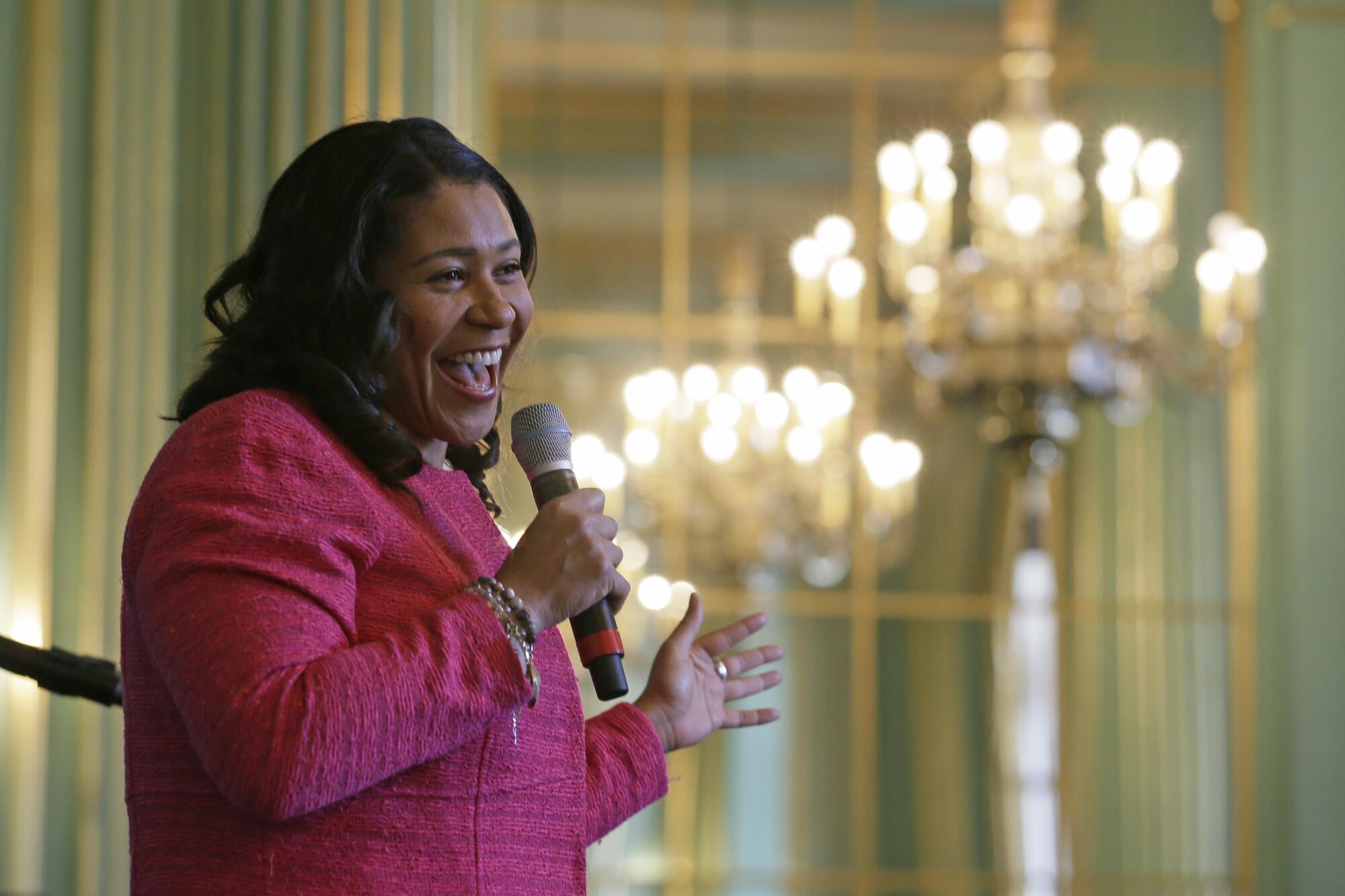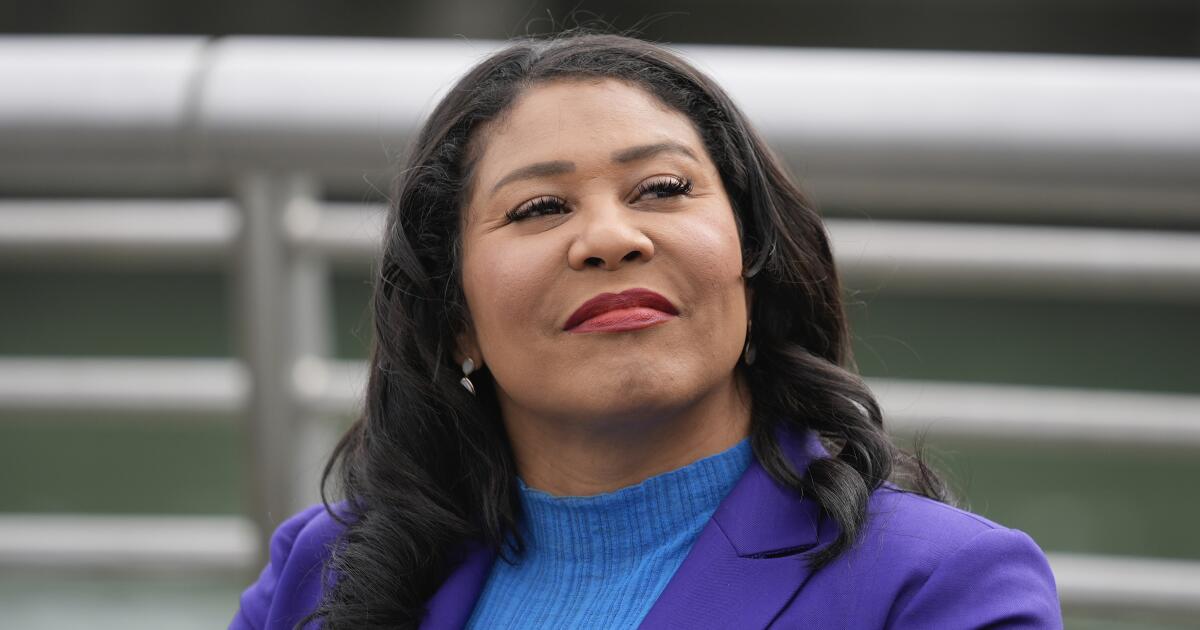If there’s anything Mayor London Breed has learned in office, it’s that compassion has its limits.
So when she talks about her steady tack right in recent years on issues such as retail crime and homelessness, she’s direct and unapologetic. Sitting at the helm of one of America’s most celebrated cities and trying to keep that city on course, she said, has opened her eyes to some hard truths. Among them: That without guardrails, there are people who will take advantage of San Francisco’s generous spirit and behave in ways that drag the city down.
“We’ve gone too far in just letting people get away with things,” Breed said. “And as a result, people have been getting away with things.”
Breed, 50, made history six years ago when she became the city’s first Black female mayor. She was president of the powerful Board of Supervisors when then-Mayor Ed Lee died of a heart attack in December 2017. She won a special election to fill his seat the following June and was elected to a full term in 2019.
She’s now fighting to keep her seat in November against four other high-profile Democrats, three of them wealthy white men. This time, her greatest political threat isn’t coming from the left. Instead, the challengers with the most traction are two fellow moderates who’ve criticized Breed for not doing enough to rid the city of the tent encampments and open drug dealing pervasive in certain neighborhoods or to speed its recovery from the economic malaise still lingering from pandemic-related shutdowns.
Breed reflected on her tenure during a lengthy sit-down interview with The Times last month outside a café at the Transamerica Pyramid. The iconic building reopened in September after an extensive renovation that some see as as a symbol of downtown’s nascent comeback.
San Francisco Mayor London Breed, left, and Los Angeles Mayor Karen Bass are the first Black women to lead their cities.
(Josh Edelson / For The Times)
Breed has never been a bleeding-heart progressive, despite San Francisco’s liberal reputation. But the Breed of six years ago was more open to experimenting with a progressive reformist agenda when it came to solving intractable issues such as addiction and poverty. That included promoting “safe injection” sites — essentially sanctioned, supervised illicit drug use — to counter the staggering toll fentanyl was taking on the city’s homeless population, and encouraging police to form better relationships with residents in marginalized communities.
In the last two years, by contrast, she has become a leading voice in a statewide movement to crack down on homeless people and addicts who refuse shelter or treatment. And she successfully championed two local ballot measures that bolster police surveillance powers and require drug screening and treatment for people receiving county welfare benefits who are suspected of drug use.
Although some people dismiss her policy shifts as a calculated political ploy, Breed said her decisions are about personal growth, fueled by what she sees as a lack of accountability that has allowed social problems to fester.
“San Francisco has never abandoned its values of compassion and second chances,” said Breed, wearing one of her signature suits, this one a bold cerulean blue. “But I think that before the pandemic, we were headed in a direction with criminal justice reform, police reforms, and it went too far. And when I say it went too far, if you commit a crime, you have to be held accountable somehow.”
Born into poverty in the Western Addition, at the time one of San Francisco’s toughest neighborhoods, Breed doesn’t shy from political combat. She was raised by her grandmother, lost a sister to a drug overdose and has a brother who is serving time in prison for robbery and other charges. Throughout her career, she has fought and won against critics who doubted her.
“London will fight back. She’ll snap. She’ll show you she’s from Plaza East projects,” said James Taylor, a political science professor at the University of San Francisco and author of “Black Nationalism in the United States: From Malcolm X to Barack Obama.”
“She’ll go street on you in a second. That’s why the men who are running against her have to be careful.”

“London will fight back,” says University of San Francisco professor James Taylor. “She’ll go street on you in a second. That’s why the men who are running against her have to be careful.”
(Eric Risberg / Associated Press)
Breed’s evolution started with the COVID pandemic.
She was celebrated, initially, for her decisive response when she became the nation’s first big city mayor to declare a coronavirus state of emergency, followed soon after by a citywide lockdown. The move is credited with saving thousands of lives and keeping San Francisco’s death rate relatively low.
But a year later, she was on the defensive.
The combination of remote office work and prolonged restaurant and bar closures decimated downtown street life. And parents fumed as city schools remained closed for months longer than public schools in most districts in the nation.





 Source link
Source link 













